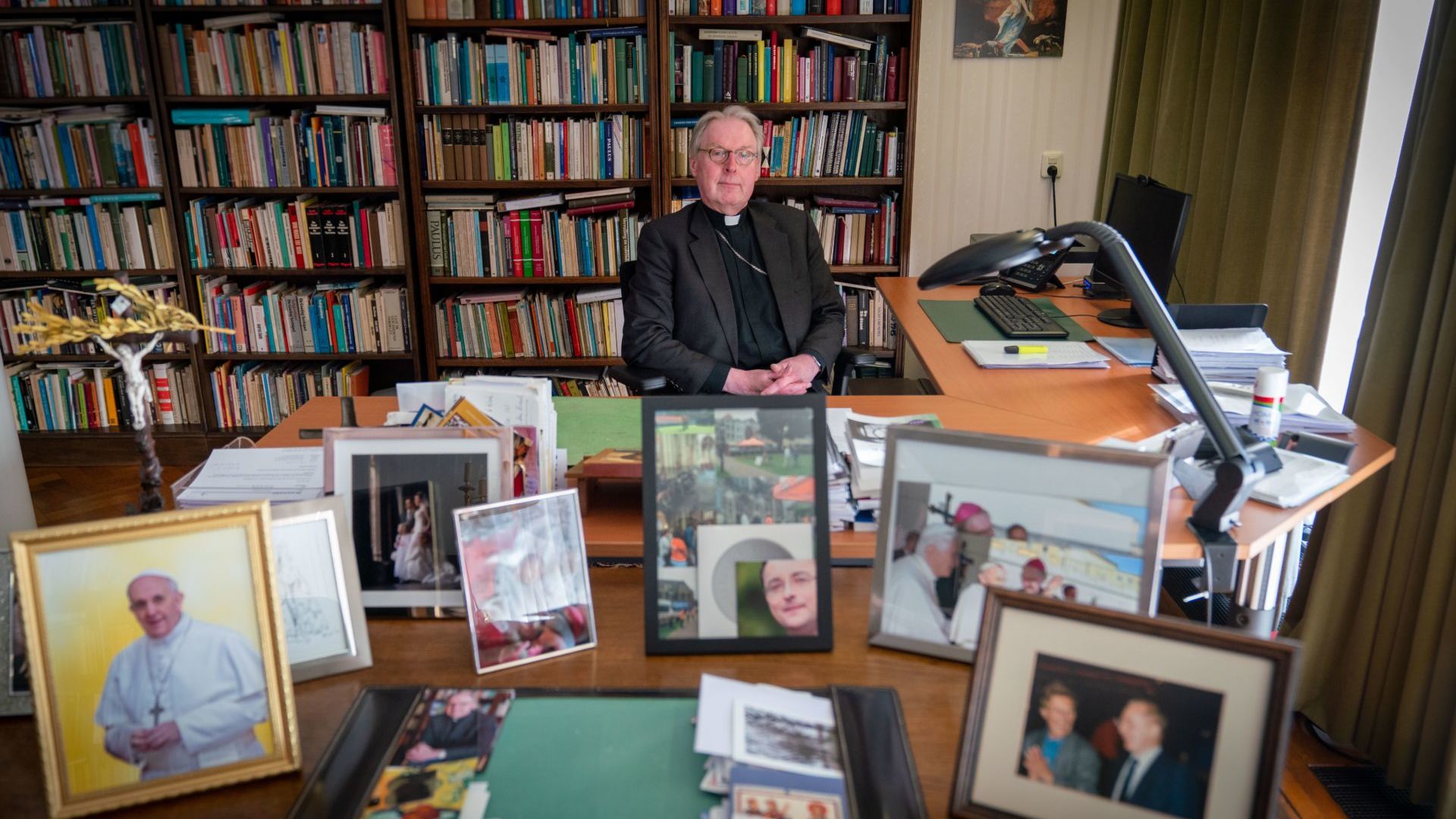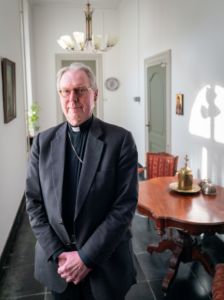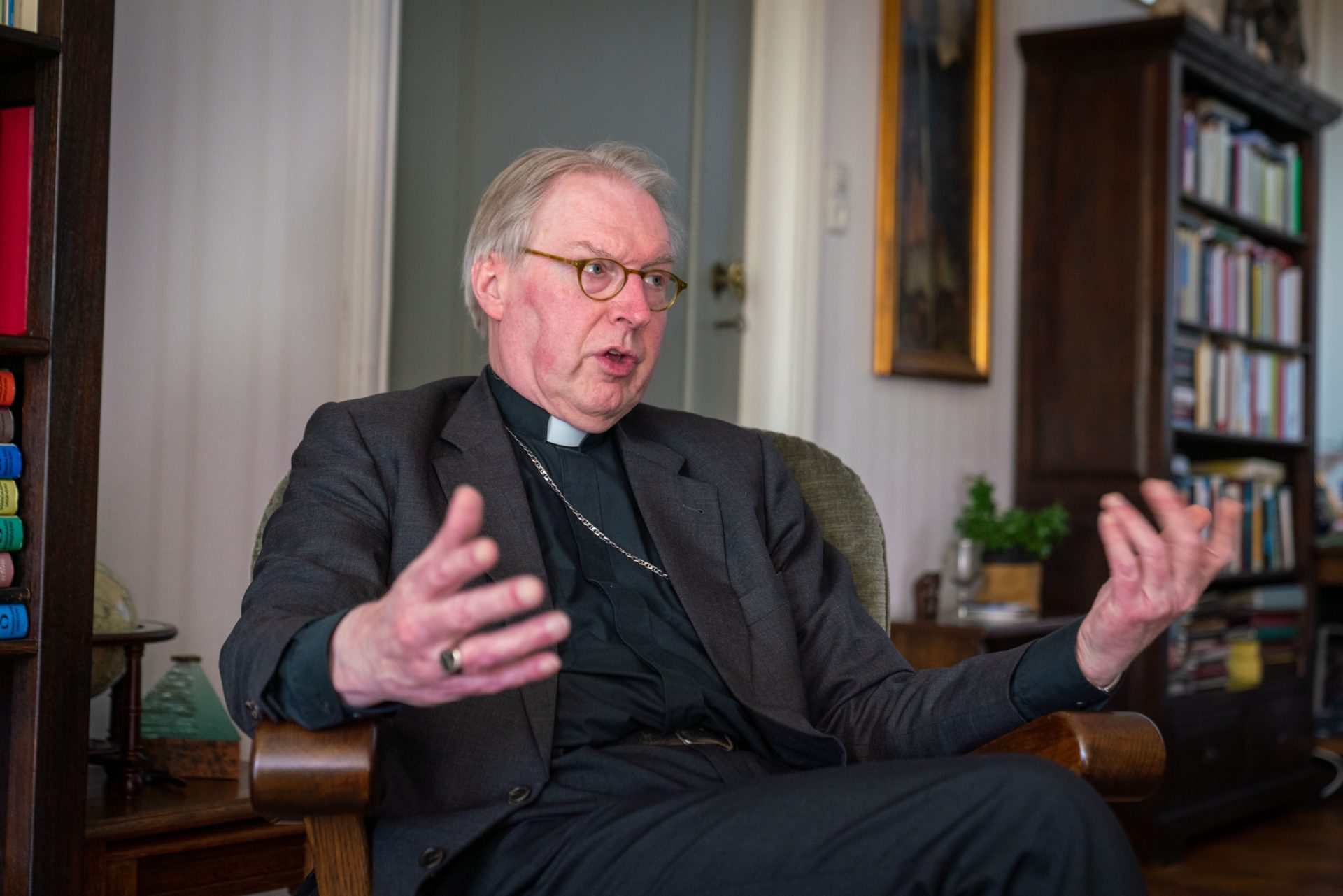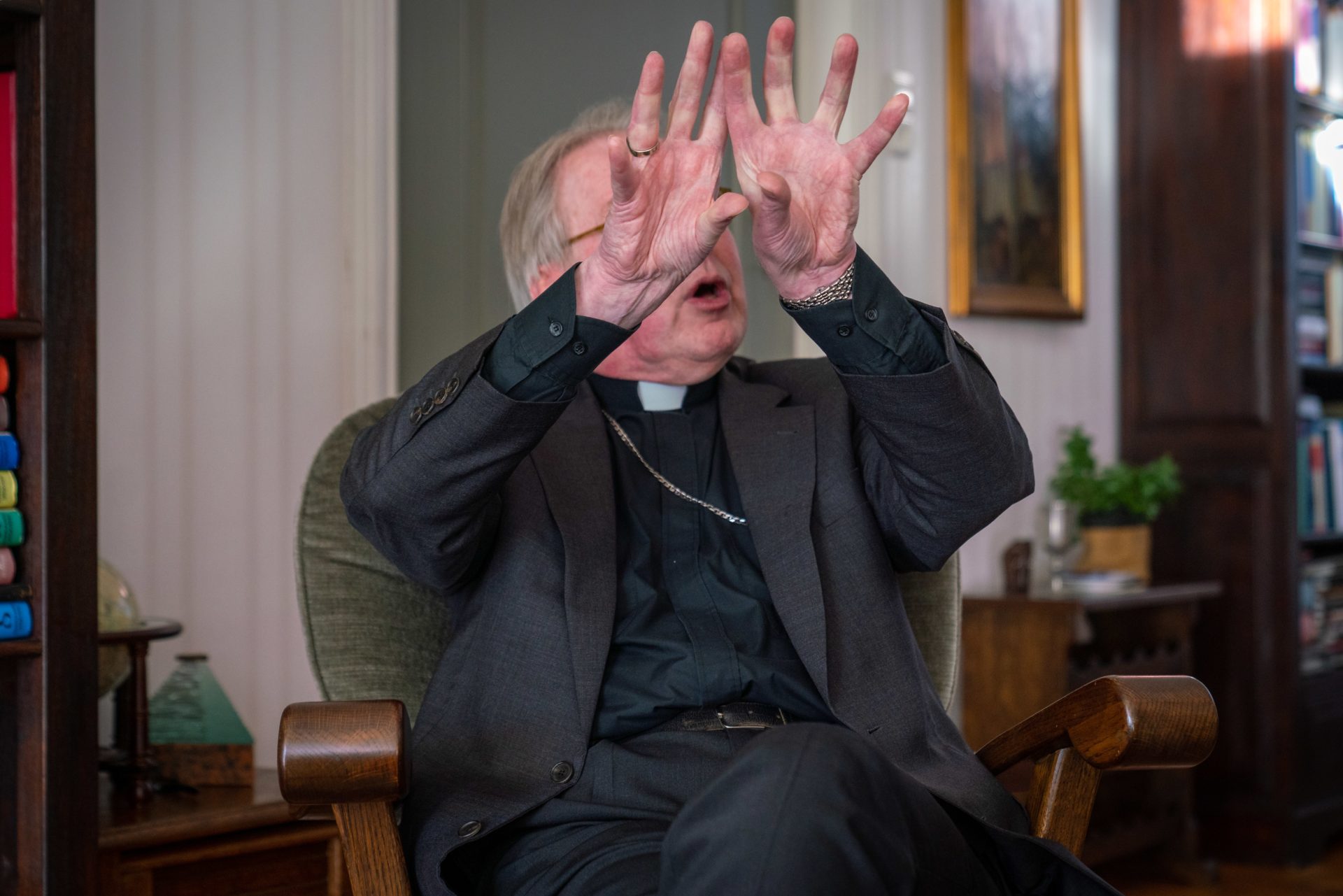Bishop De Korte: ‘The bond with the university has become less intense’
-
 Gerard de Korte. Foto: Erik van 't Hullenaar
Gerard de Korte. Foto: Erik van 't Hullenaar
One year after breaking with the Catholic Church, bishop of Den Bosch Gerard de Korte still regrets that Radboud University is no longer Catholic. ‘Has the Church lost something? The bond with the university has become less intense.'
It’s late summer in Den Bosch. Outdoor cafés along the Parade are full of people, day trippers enter the impressive Saint Johns Cathedral. A little further lies the Episcopal Palace, where bishop Gerard de Korte has his office. On his wooden desk stands, among other things, a picture of Pope Francis, a name that will be mentioned a few more times during the coming hour.
Exactly one year ago he was going through a difficult time, says De Korte, who is wearing a black suit with a white collar and a cross around his neck, while serving coffee with cake. As ordinarius loci or local bishop he was responsible for maintaining contact with Radboud University, together with other officials on behalf of the Bishops’ Conference. Until that infamous day when the bishops wrote to the university and Radboud university medical center (Radboudumc) informing them know that they were withdrawing the Catholic designation. From that moment on, everything changed. For the first time since its establishment in 1923, the university was no longer a Catholic institution.
The decision made by the Bishops’ Conference, of which moreover De Korte is a member, still does not sit well with him. ‘There’s a strong secularisation going on in the Netherlands’, he says. ‘It’s precisely in that context that you have to maintain a relationship with Catholic institutions. The separation from Radboud University is a loss in this respect.’
Student Chaplaincy
But De Korte, an astute speaker who spreads his arms several times during the conversation or ostentatiously raises them in the air, is also relieved, he says, because the board of Radboud University reacted calmly to the bishops’ action. ‘The university holds on to its roots, the Catholic history of emancipation. Lecturers and students have announced that they will start thinking about how to fulfil their mission in the future. I’m looking forward to the outcome of that process, at the centenary in 2023.’
As a local bishop, De Korte has stated that he thinks it is important to remain connected with Radboud University until then. ‘Of course, we have certain ties with the Catholic institutes on campus. And the university’s Executive Board has promised me that the Student Chaplaincy will also remain.’
When was the last time you were on campus?
‘Last autumn I celebrated the Eucharist in the Student Chaplaincy, on a Sunday evening. But due to the Corona crisis, I visited the campus less than usual anyway.’
Now the university has lost its Catholic designation, it no longer falls under the canonical rules of the Vatican. Also, directors of the Supervisory Board are no longer appointed by the Bishops’ Conference. Are you worried that the university will eventually become further removed from the Church and from Catholic thinking?
‘This is an interesting issue. I hope that the awareness leading up to the centenary will lead to this history of Catholic emancipation being given a permanent place in the university’s identity. But this depends on the board, the students and professors.’
Can the decision by the Bishops’ Conference be reversed?
‘That’s a question of conscience. I don’t see that happening anytime soon, but the future is open. If we were to find a new way forward…’
The bishop hesitates for a moment. ‘When I became bishop of Den Bosch in 2016, the conflict was already raging with the Bishops’ conference. In a conversation with the papal nuntius (ambassador of the Vatican in the Netherlands, Ed.) I was urged to keep in touch the best I could with the main Catholic organisations. For example, Tilburg University, KRO-NCRV, CordAid and also Radboud University.’
Isn’t that contradictory? The Bishops’ Conference withdraws the ‘Catholic’ designation from Radboud University, but at the same time wants you as bishop to stay in touch.
‘Yes, this may seem contradictory. But Radboud University lies within the territory of my diocese and this makes for a special bond.’
‘For a long time, there has been discussion about the nomination of candidates to the SKU Board (Stichting Katholieke Universiteit Board), which we as bishops have to approve. In my analysis, the case gained momentum due to the passage from the SKU to the Enterprise Section, and the decision of that judicial body. (The Enterprise Section decided that the SKU Board of Radboud University and Radboudumc could temporarily appoint board members themselves, without the need for approval from the Bishops’ Conference, Ed.). As a result, the conflict between the parties has escalated. What we as bishops discussed among ourselves is irrelevant, but it’s true that there was internal discussion.’
‘It’s true that there was internal discussion with the bishops’
About the appointments to the SKU Board? The candidates nominated by the SKU Board were shot down one by one by the Bishops’ Conference, because the people weren’t Catholic enough – for example because they were not married in church.
‘The image of the appointments is often indiscriminate. It’s not the case that we have shot down all the candidates of the SKU Board, because on one occasion we appointed two people and the impasse was broken for a while. But it’s true that we in the Church are trying to protect the sacrament of marriage.’
How many people still marry in church in 2021?
‘It’s important that the Catholic Church defends marital fidelity and lasting relationships. Things go wrong for a lot of couples and there’s a major relational crisis in society. Admittedly, I know people in my own circle of family and friends who have failed to keep their wedding vows, who I still think are or are trying to be very good Catholics. But in the case of Radboud University, it was about the supervisors who must propagate the identity of the institution. These must be people who give shape to Catholicism in word and deed.’
A year ago Radboud University lost the predicate ‘catholic’. What does this mean, what has changed since then and where do we go from here? Vox is publishing a series of articles on these questions in the coming weeks.
Do you really have to be married in church for that?
‘But it wasn’t just that. One of the candidates (Dymph van den Boom, Ed.) said, in her conversation with the bishop of Haarlem-Amsterdam, that she wasn’t religious. This is very honest of her, but not wise if you, as a director, must watch over the governance and the Catholic identity of the university. She could also have said she was a drifting Catholic.’
Would she have been accepted if she had said she was a drifting Catholic?
‘There are many drifting Catholics. But if you say you’re agnostic or an atheist, it’s very hard for a bishop to say you’re fit to be a board member. Isn’t it a bit weird for a Catholic university to appoint a non-religious woman? That’s where it clashed, it created tension. I think many people can understand that.’
‘Isn’t it a bit weird for a Catholic university to appoint a non-religious woman?’
Doesn’t the pond to fish from become very small, if you need to be a good director and a practicing Catholic?
‘The Catholic church isn’t very big in the Netherlands nowadays, but also not very small. The Knights of the Holy Sepulchre and Malta alone (recognised by the Roman Catholic Church as two organisations with a lot of intellectuals, Ed.) have hundreds of people who run large companies or are professors. As bishops, we have several times introduced candidates of a level that were sometimes not accepted by the SKU Board, for example because they were the wrong gender. I understand the latter because women must also be represented on the board.’
How come this is a problem in Nijmegen, but not in Tilburg, at the other Catholic university?
‘Partly because Wim van de Donk has been appointed there as rector. He has earned his stripes as the King’s Commissioner and has a long track record with the Netherlands Scientific Council for Government Policy (WR). In addition, he is convincingly Catholic and has been vice-chairman of a church board. He obviously doesn’t bend the university to his will as a dictator, but he can raise questions on identity and Catholicism in a very central place. He also wants to do this very clearly. He thinks the university should not have been called Tilburg University, but Catholic University Brabant. He is not ashamed of the word Catholic.’
So, if he had worked at Radboud University…
‘(interrupts) He was asked, is what I heard, as successor to Loek Hermans on the SKU Board. But, at the time, he couldn’t combine it with his job as Commissioner. Later he returned to science in Tilburg. That’s how you spot essential personnel: who sits where, at what place?’
In January and February 2022, the Dutch bishops will have their five-yearly ad limina visit to Rome, during which you will report to the Pope about the situation in the ecclesiastical province and the diocese. Will the issue of Radboud University also be discussed there?
‘I’m not sure, but I suspect so. That whole week we will visit all the Congregations, including the one on Catholic Education. It’s almost unimaginable that we won’t talk about Radboud University.’
‘An informal bond always depends on individuals’
Has the Church lost something now Radboud University isn’t Catholic anymore?
‘The bond with the university has become less intense. Of course, a bond is still possible, because there is sympathy in Nijmegen for me as local bishop. But an informal bond always depends on individuals. If this was institutionally guaranteed, it would be a lot better. It now depends on the goodwill and awareness of board members, students and professors whether they consider it relevant to be taught about Catholic identity.’
Discussion forum in Den Bosch
Bishop Gerard de Korte says he is always open to contact with the academic world. That’s why, since last year, he organises a discussion forum with professors from Catholic University of Leuven, Tilburg University and Radboud University. During these forums, among other things, Pope Francis’ encyclicals are discussed – these are texts written by the Pope that should set readers thinking.
‘The encyclicals Laudato Si’ (on environmental issues, Ed.) and Fratelli Tutti (on fraternity and social friendship, Ed.) of Pope Francis are very important texts on Catholic social thinking’, says De Korte. ‘They can inspire scientists from all faculties. For example, how can biologists contribute to the preservation of the earth? How can lawyers guarantee the rights of refugees and migrants?’






